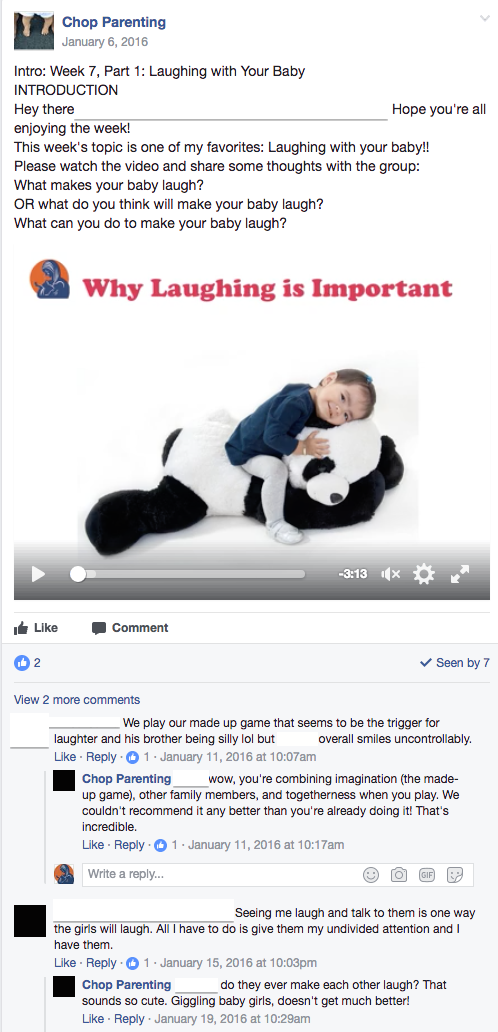HOW CAN WE HELP YOU? Call 1-800-TRY-CHOP
In This Section
'Like' This: PolicyLab Uses Social Media to Support New Moms
 From Facebook pages to Twitter feeds, social media has transformed how we communicate and gather news about our world. Seventy-five percent of today’s parents use social media according to a Pew Center Research report, and 79 percent of those parents reported that they learned beneficial information from logging onto their channels. James Guevara, MD, MPH, pediatrician and a founding member of PolicyLab at Children’s Hospital of Philadelphia, has seen the power of these platforms at work while conducting research into mothers with postpartum depression.
From Facebook pages to Twitter feeds, social media has transformed how we communicate and gather news about our world. Seventy-five percent of today’s parents use social media according to a Pew Center Research report, and 79 percent of those parents reported that they learned beneficial information from logging onto their channels. James Guevara, MD, MPH, pediatrician and a founding member of PolicyLab at Children’s Hospital of Philadelphia, has seen the power of these platforms at work while conducting research into mothers with postpartum depression.
In ongoing research presented at the Pediatric Academic Societies 2017 Meeting, Dr. Guevara and his team shared how they’re developing and studying a Facebook-based parent coaching program for mothers with postpartum depressive symptoms to improve their ability to care for their children. The research stems from Dr. Guevara’s observations that in-person coaching classes can be expensive and often inconvenient for mothers experiencing depressive symptoms.
In this Cornerstone Q&A, we talk to Dr. Guevara, who is also a professor of Pediatrics and Epidemiology at the University of Pennsylvania, about how he thinks social media can make an impact for families of today and the future.
Let’s talk about the background for your study. How are postpartum depression and child development linked? Why study one to learn about the other?
We know from a number of longitudinal studies that mothers with depression can have dysfunctional parenting practices. They have been observed to be either overly harsh disciplinarians with their kids, or overly lenient. Both forms of parenting are not associated with back-and-forth communication in a loving, reciprocal relationship with a young child, and have been associated with a greater risk of developmental delays, growth problems, and — over time once they enter school — behavioral problems. That includes depression as well as attention-deficit/hyperactivity disorder. So, there are a number of different long-term concerns with a parent who has depression.
Why did you decide to use social media as a platform to reach these moms?
Originally, we proposed to do in-person parent coaching classes. We had taken a well-validated parenting education program aimed at coaching parents on how to respond when their kids are starting to have behavioral problems, and adapted the program for mothers experiencing postpartum depression. And what we found is that even though the mothers signed consent forms and were thus willing to attend, the attendance rates were really poor. Only about half of them came to one session. I’m speculating a bit here as to why they didn’t come, but there’s some of the usual suspects like transportation issues, lack of time, working full-time or being single parents, so just trying to get the kids together and out of the house to attend a weekly evening session can be a struggle.
So, we started to think: How can we reach this important population? It occurred to us as we were winding down that program, that most of the women had cell phones. And when we asked them what they used it for, they said they liked to connect with other people. It was important for them to have a social network and use their phones to do that. That was our ‘aha’ moment: Why don’t we take the program and try to put it on social media? It would allow women to access the program from home and allow for asynchronous participation, so they don’t have to be online at a specific time and can do it when it’s convenient for them.
Can you describe the steps you took to prepare for your study?
 We took a program called Parents Interacting with Infants, or PIWI for short. We developed an eight-week in-person program based on PIWI and on American Academy of Pediatrics guidelines on early infant care. We conducted two parent focus groups to obtain feedback on the content. It was designed for mothers of infants between 2 and 6 months of age. The program had eight sessions with eight topics, on things like reading to your infant, safety, feeding, sleep, play, and parent-child interactions.
We took a program called Parents Interacting with Infants, or PIWI for short. We developed an eight-week in-person program based on PIWI and on American Academy of Pediatrics guidelines on early infant care. We conducted two parent focus groups to obtain feedback on the content. It was designed for mothers of infants between 2 and 6 months of age. The program had eight sessions with eight topics, on things like reading to your infant, safety, feeding, sleep, play, and parent-child interactions.
We then took this content and put it into a “secret user” Facebook group, meaning that the content and the participants were not known to anyone outside the group. An administrator invited participants to the group when they enrolled in the study. The content was converted to online material, for example, a video clip, or a narrated slideshow set, and we tried to keep the literacy level low; that’s why we did the voice-over narration. We staged the content over a week in three releases, that way they could look at the content, post comments on it, and then we could respond, or other participants could respond. It would be a group interaction. There would be the introductory material, the exercise, and the reflection and homework.
Out of 24 women in the study, you compared 12 randomized to the in-person classes with 12 using the Facebook program. What are some things you learned?
We followed the participants for the full eight weeks, and we did pre- and post-study measures. We included information on their depression scores and their self-reported parenting efficacy — that is, how well they did in their parenting; it’s a confidence scale.
So first, we looked at attendance. We set up a meeting once a week for the 12 women randomized to the in-person group at times that were convenient for them. We provided a meal, childcare, and SEPTA tokens. And what we found was that only three of the 12 attended any of the sessions. And then one or two attended two or three sessions. None attended half of or even four. Poor attendance, but we predicted that.
What did you learn about the Facebook group?
For the other group, we had two groups of six, and the administrator invited the participants to participate in the Facebook group. We found 100 percent of them viewed at least one session. Eight-nine percent attended half the sessions, and 78 percent attended every session. That’s remarkable, and that’s better, in fact, than typically what happens in in-person groups. So, we were really excited. A number of them also posted comments.
That’s great! Were any findings surprising to you?
In terms of outcome measures, we were most interested in the feasibility of the social media-based program, but we were really pleased to see that the women in the social media group had a decline in their depressive symptoms that was statistically significant. Meanwhile, the in-person group remained the same. So that was unexpected. I didn’t expect depression symptoms to be impacted by this. The other thing that was of interest was that parenting efficacy went up in the social media group and went down in the in-person group, and in a statistically significant fashion. To see a statistical significance with only 12 women in each group was really remarkable, but obviously we can’t make big conclusions about it because it’s a small sample. This probably suggests we need a larger clinical trial to assess outcomes.
Did you gain any other insights from the study?
Facebook is great because you can get in-depth analytics, like whether they even looked at the content. And sometimes, the participants didn’t look at the content each week. Sometimes, they would miss a week, then come back and do two weeks-worth of content in one week. So, you could really tell there would be weeks where they’re under stress maybe and couldn’t do it and came back to it. The satisfaction measures were relatively high; they liked the content, they liked interacting on Facebook. What we don’t know is whether they friended each other — that was the hope, but we couldn’t get the data.
Why do you think social media is so effective, and how do you think it might help other areas outside of depression?
One, I think it really helps to decrease the access barriers where people have to go somewhere to get that content, to get that coaching and teaching. It permits them to do it from their home. And in some respects, it’s cheaper. We’ve been contacted about this by the NYC Department of Public Health; they’re interested in this method because it will cut down on their cost in doing depression education with parents. You don’t have to pay for space, food, transportation, all that stuff.
I think also the asynchronous participation is a big boon because even if you’re home, you don’t have to sign on at a particular time. If you’re a parent, and you’re a single parent in particular, things always happen. You can’t guarantee a time you’ll be available. What if you say 7 p.m., but then that day your 6-month-old is sick, and you can’t get online? So, I think it has a lot of potential usability, and not just when it comes to depression. In fact, a lot of potential parent coaching topics or parenting approaches, like taking care of children with chronic diseases, medications, feeding routines — a lot of this can be done and taught through social media.
What are some future directions for the research?
Future directions might include the development and testing of an app. An app will actually make it easier to participate because then women can just download the app, get all the content, look at the content — not in a particular sequence but in the order in which it meets their needs. And they can also get immediate access to the groups.
Visit PolicyLab for more information on Dr. Guevara’s research into parenting interventions for mothers experiencing postpartum depression.